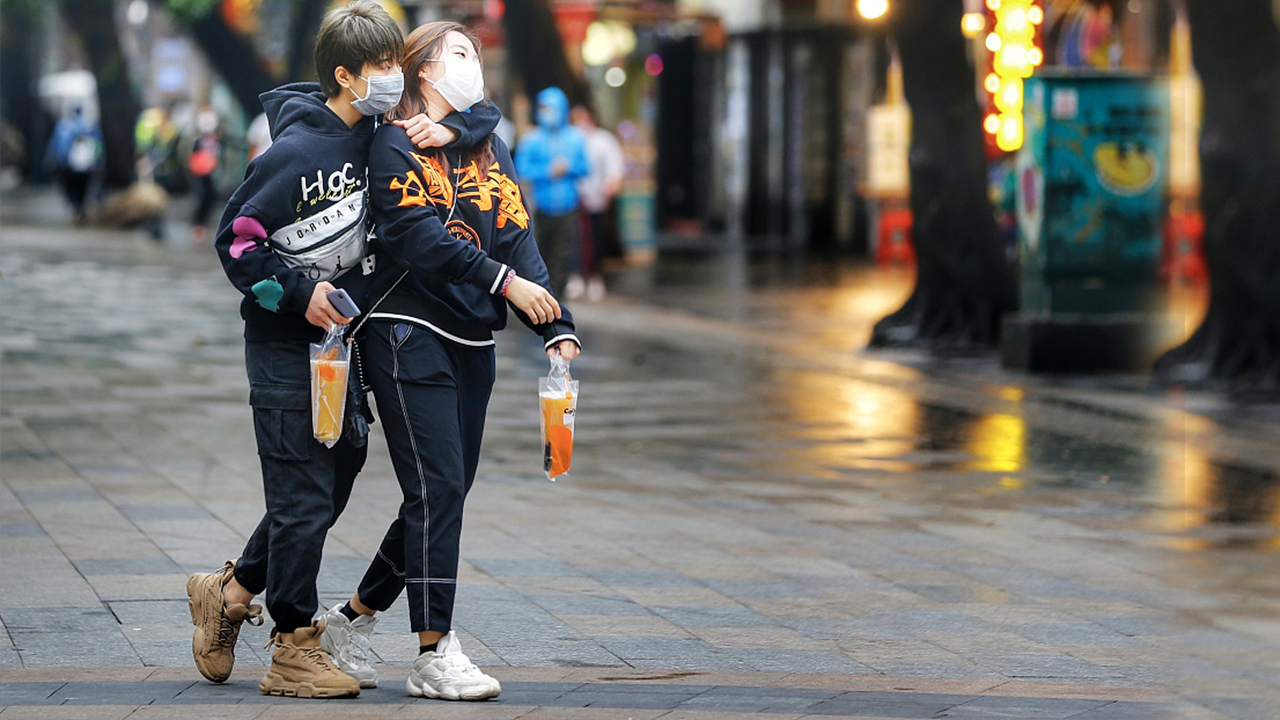"He even expected me to pay for his drinks!" laughed Hope, teetotal herself, a language program organizer in her early 30s living in Beijing. The "he" in question was a less-than-courteous suitor as Hope recently embarked on her first date since China's lockdown earlier this year, which abruptly put an end to all socializing in an attempt to curb the spread of the new type of coronavirus.
But now, with most of China considered low-risk for virus contagion and temperatures rising, balmy nights, buzzing streets and newly-reopened bars and restaurants have made the idea of dating appealing once more. CGTN spoke to a group of single, Beijing-based millennials to ask if their perspectives on dating had changed since the lockdown.
A meditative mood
The prevailing mood of those interviewed was meditative; time away from work and socializing had given them the opportunity to reconsider their priorities.

A couple take in a view of Beijing, China. /VCG
"The pandemic didn't change me a lot. But it actually gave me a long time to think about who I really love," said Kevin, a 27-year-old from east China's Anhui Province who is currently working in the media industry. "I've not been able to leave Beijing since January, and there were no places in the city I could go, so I had a very long time to think about someone," he detailed. "I realized I may really love someone, so I wrote a song for this special person," he said.
But while time at home brought about introspection, a desire for companionship manifested itself in other ways.
Two girls CGTN interviewed mentioned speaking to their exes again: One seemed sheepish, as she believed the connection was a bad idea and would go nowhere, while another said that her ex had messaged her during the lockdown after three years of no contact.
Outside of the private sphere, one interviewee said that had she felt a change when out in public.
"I think working class men have been accosting women more on the street as there were fewer walking in public places" during the lockdown, observed Qiqi, 26 and originally from Sichuan Province in southwest China. "I was in several situations like that," she said.
Meanwhile, as work picks up, another girl said she was looking forward to dating again as a way to relax.
'A golden period of online social exploration'
While those living under lockdown may have spent more time looking within, data from Tantan, one of China's main dating apps which is similar to Tinder, showed that usage soared during this period.
In the first half of February, when most Chinese people were staying at home, Tantan's usage time per capita increased by more than 30 percent in comparison to the same period a month earlier, the company said in early April. It wasn't until the end of February when people began to resume work that user behavior dropped to normal levels.
A large number of old users re-downloaded the app when the coronavirus pandemic was severe in China. From early to mid-February, the number of users returning to Tantan increased by 25.9 percent in comparison to the first half of January.
12 midnight to 1 a.m. was a "golden period of online social exploration," according to the company. The number of people using the app during this hour was up 60 percent during early to mid-February when pitted against data from the first half of the previous month.
The use of dating apps in China, which more socially conservative than western countries, usually has connotations of casual relationships or one night stands. In China, single people typically meet potential partners through work, socializing or family arrangements. Older generations are likely to disapprove of app use for dating, and securing the broader family's blessing of a partner is more important than in the West. Many users also worry about privacy.
But, data from statistical analysis platform Statista shows that the online dating market in China is growing steadily, excepting an anticipated blip in 2020 due to the negative economic impact of the coronavirus pandemic. Statista places user penetration at 3.8 percent this year, with this figure expected to rise to 5.6 percent by 2024.

A couple celebrate Valentine's Day amid the coronavirus outbreak in the southern Chinese port city of Guangzhou, February 14, 2020. /VCG
In Tantan's nearly six years of operation, the proportion of times a female user slides right on a potential match's profile, to "like" them, has stayed steady at 6 percent. Male users slide right 60 percent of the time. But, China's lockdown also coincided with the most active for female Tantan users on record: They "liked" potential partners 9.8 percent of the time. But when work in China resumed, this figure dipped back to its normal value.
Wine-and-meat couples
China's divorce rate spiked following the lockdown, it has been reported. In Wuhan, the heart of the coronavirus outbreak in China, the divorce rate doubled post-confinement in comparison to its level before the virus outbreak, one official told Chinese newspaper the Global Times on April 14. Possible reasons for the jump include conflicts arising during confinement and a rush for services which were previously suspended.
The question, "Why did couples break up during the outbreak?" was viewed over 21 million times on Zhihu, the Chinese equivalent of Quora, as of early May. The top answer, which received over 30,000 likes, posed a new concept: "Wine-and-meat couples." This refers to what might otherwise be known as "fairweather couples," whose relationships last in a positive environment but falter when times get tough.
Among the Beijing-based young people CGTN spoke to, the importance of seeing friends after the lockdown restrictions eased was usually mentioned ahead of dating.
"The pandemic has reminded me that a woman must have the capacity to make a living for herself, then she can step into marriage," Qiqi said.
Both Hope and Kevin said that the divorce statistics hadn't made them more cautious about relationships. "But, I understand that it's not easy to find the right person," Hope said. "It's better to be alone than with someone you can't spend time with."
Additional reporting by Le Wang
 简体中文
简体中文





